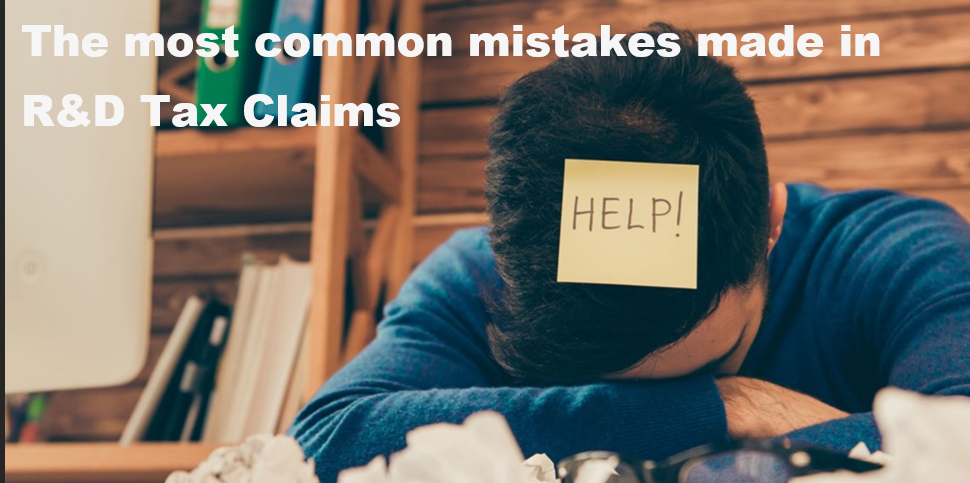The most common mistakes made in R&D tax claims
- Typical R&D claim
Not all R&D projects occur in laboratories, and your R&D team doesn’t need to wear white coats. Any company in any industry may be eligible to claim R&D tax credits, so long as the company is undertaking development activities that seek to achieve an advance in science and technology. If the project contained a level of technical uncertainty for the competent professionals involved- if there were moments where you and your team weren’t sure how to proceed, or you weren’t confident if your technological goal was achievable – that’s a good indication that qualifying R&D activities were taking place.
- Not claiming under the right scheme
The R&D Tax Credits scheme is subdivided into two branches: the SME scheme (or small/medium-sized businesses) and the Research and Development Expenditure Credit (RDEC) scheme for larger companies.
Before making a claim, it’s essential to understand which of these branches your business comes under. Legally, HMRC considers a larger company to have over 500 employees and a yearly turnover of more than €100 million OR a balance sheet above €86 million. A company falling below these criteria is considered an SME and should typically use the SME branch of the scheme.
- Non – qualifying expenditure
Everyone wants to maximise the qualifying R&D expenditure in their claims, including the costs of consumable items; for example, the components of a prototype used in testing and the scrapped have always been intended to qualify.
Likewise, an apportionment of water, fuel and power to the R&D activities will be accepted by HMRC.
However, where a company sells or otherwise transfers ownership of items produced in its R&D activity as part of its ordinary business, then the cost of consumable items that form part of those products is excluded from expenditure qualifying for relief.
Using the example above, if the prototype was sold to a customer, even at a discount or gifted to someone else as a goodwill gesture, the costs of the parts could not be claimed as qualifying R&D expenditure. This is the point that other firms often miss, and HMRC could successfully challenge their claims.
- Inaccurately accounting for workers outside of the company
Some companies undergo all their R&D projects internally using their employees, but others require work from external parties. When making an R&D Tax Credits claim, accounting for this is complex, but you must get it right. Something as innocuous as IP ownership and clauses around the future use of any IP can potentially kill off an entire R&D claim. It is also incredibly important to understand the differences between subcontracted R&D and work done by Externally Provided Workers (EPWs). Addressing this properly in the early stages of a claim can ensure R&D claims are maximised, particularly under RDEC, where subcontractor restrictions exist.
- Not claiming all qualifying costs
There are several areas of R&D expenditure that you can include in your R&D tax credits claim, including costs for staff (salary, employer’s National Insurance and pension contributions, and reimbursed expenses), agency workers, subcontractors, software licenses, and consumable items (light, heat, power, and materials or equipment used or transformed by the R&D process). You don’t want to leave any money on the table, so to make sure your claim includes all qualifying costs, work with your specialist R&D tax credits firm.
- Not consulting R&D Tax Specialist
The best way to make a successful R&D tax credits claim is to work with a tax consultancy specialising in R&D tax credit claims. Many companies with specialist knowledge and experience throughout the UK, such as WIM. If you’re not sure if your company was undertaking qualifying R&D activities or which of your activities qualify, it’s best to ask an expert in R&D tax credits. The experts will guide you through the claims process, ensuring that your claim is maximised and meets HMRC’s guidelines. Although it is possible to make an R&D tax credits claim through your accountant (or even on your own), your best chance of making a successful claim is through a specialist R&D tax credits firm.
To learn more about R&D tax credits and whether you should make a claim, please feel free to contact us via email: at info@wimaccountants.com or call us at 02082271700, and we’ll call you back to discuss your project. Our advisors are knowledgeable, professional, and friendly and will help you determine your eligibility at no cost.
Originally posted 2022-04-13 13:55:14.

